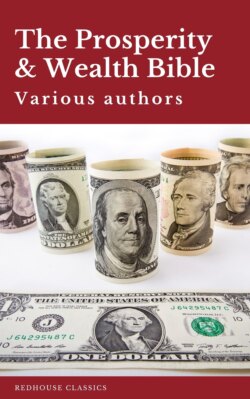Читать книгу The Prosperity & Wealth Bible - Kahlil Gibran - Страница 234
На сайте Литреса книга снята с продажи.
Preserve Your Integrity
ОглавлениеIt is more precious than diamonds or rubies. The old miser said to his sons: “Get money; get it honestly if you can, but get money:” This advice was not only atrociously wicked, but it was the very essence of stupidity: It was as much as to say, “if you find it difficult to obtain money honestly, you can easily get it dishonestly. Get it in that way.” Poor fool! Not to know that the most difficult thing in life is to make money dishonestly! Not to know that our prisons are full of men who attempted to follow this advice; not to understand that no man can be dishonest, without soon being found out, and that when his lack of principle is discovered, nearly every avenue to success is closed against him forever. The public very properly shun all whose integrity is doubted. No matter how polite and pleasant and accommodating a man may be, none of us dare to deal with him if we suspect “false weights and measures.” Strict honesty, not only lies at the foundation of all success in life (financially), but in every other respect. Uncompromising integrity of character is invaluable. It secures to its possessor a peace and joy which cannot be attained without it — which no amount of money, or houses and lands can purchase. A man who is known to be strictly honest, may be ever so poor, but he has the purses of all the community at his disposal — for all know that if he promises to return what he borrows, he will never disappoint them. As a mere matter of selfishness, therefore, if a man had no higher motive for being honest, all will find that the maxim of Dr. Franklin can never fail to be true, that “honesty is the best policy.”
To get rich, is not always equivalent to being successful. “There are many rich poor men,” while there are many others, honest and devout men and women, who have never possessed so much money as some rich persons squander in a week, but who are nevertheless really richer and happier than any man can ever be while he is a transgressor of the higher laws of his being.
The inordinate love of money, no doubt, may be and is “the root of all evil,” but money itself, when properly used, is not only a “handy thing to have in the house,” but affords the gratification of blessing our race by enabling its possessor to enlarge the scope of human happiness and human influence. The desire for wealth is nearly universal, and none can say it is not laudable, provided the possessor of it accepts its responsibilities, and uses it as a friend to humanity.
The history of money-getting, which is commerce, is a history of civilization, and wherever trade has flourished most, there, too, have art and science produced the noblest fruits. In fact, as a general thing, money-getters are the benefactors of our race. To them, in a great measure, are we indebted for our institutions of learning and of art, our academies, colleges and churches. It is no argument against the desire for, or the possession of wealth, to say that there are sometimes misers who hoard money only for the sake of hoarding and who have no higher aspiration than to grasp everything which comes within their reach. As we have sometimes hypocrites in religion, and demagogues in politics, so there are occasionally misers among money-getters. These, however, are only exceptions to the general rule. But when, in this country, we find such a nuisance and stumbling block as a miser, we remember with gratitude that in America we have no laws of primogeniture, and that in the due course of nature the time will come when the hoarded dust will be scattered for the benefit of mankind. To all men and women, therefore, do I conscientiously say, make money honestly, and not otherwise, for Shakespeare has truly said, “He that wants money, means, and content, is without three good friends.”
